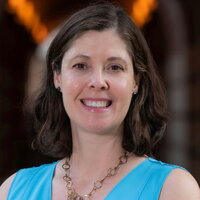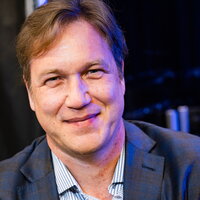A dynamic duo in physical chemistry, veteran professors Christy F. Landes and Stephan Link, will continue pursuing their independent, distinguished scientific careers at the University of Illinois Urbana-Champaign as members of the chemistry faculty.
Catherine J. Murphy, professor of chemistry and Head of the department, said that she and the rest of the faculty are thrilled that these two experienced professors and researchers will be joining them as colleagues.
“Christy and Stephan are superb scientists and I know they will be excellent colleagues. I look forward to brainstorming about new projects with them,” Murphy said.
In 2006, Landes and Link launched their respective academic research careers, and after more than a decade pursuing their scientific goals at Rice University, they look forward to continuing their research in the collaborative and interdisciplinary research environment at Illinois.
Landes said the single best thing about being an academic researcher now, as opposed to 20 years ago, is that all of the interesting problems are interdisciplinary.
“The need to work across fields rewards people and institutions that value collaboration and cross-disciplinary learning. I love learning from experts outside my area of expertise,” Landes said.
Both researchers said they are eager to work with some of the best physical chemists in the country at Illinois and with excellent scientists and engineers in other fields and also collaborate across disciplines at various research centers on campus, including the Beckman Institute, Materials Research Institute, the Cancer Center and others.
“Today's problems are becoming increasingly complex and need a true team effort to achieve results that are impactful for society,” said Link, who is doing pioneering work in nanophotonics.
“Illinois knows how to do cross-disciplinary science and engineering,” said Landes, whose overall research focus has been improving experimental and theoretical methods to better understand structure-function relationships in biological processes with an overall goal to design better materials.
“We design novel microscopes and exploit modern, data-driven methods to take 3D and even 4D movies of proteins and other molecules undergoing a range of physical and chemical processes as they interact with functional interfaces such as polymers or photocatalysts,” said Landes, who has been a professor of chemistry at Rice University since 2009 with appointments in electrical and computer engineering and in chemical and biomolecular engineering.
And as Director of the Center for Adopting Flaws as Features (CAFF), Landes leads a multi-university team seeking to characterize and thereby exploit chemical heterogeneity using novel experimental and computational tools to obtain a deeper understanding of disordered materials that show potential for unique chemical function. Link and Illinois chemistry professor Martin Gruebele are also members of CAFF, which was established in 2021 with a National Science Foundation grant.
Landes will join the Illinois chemistry faculty in June as the Jerry A. Walker Endowed Chair in chemistry. The fund was established in 2021 by Christine Walker to support an endowed chair in memory of her husband, Jerry A. Walker (BS, ’69), who graduated with high honors and highest distinction.
Link will join the faculty in January 2024 as the Charles W. and Genevieve M. Walton Endowed Professor. The professorship is supported by the Charles W. and Genevieve M. Walton Endowed Faculty Excellence in Chemistry Fund, which was established in 2011 by Charles W. Walton (BS, ’30) and Genevieve M. Walton.
A physical chemist and chemical physicist by training, Link has been at Rice University since 2006 where he has been a professor of chemistry and electrical and computer engineering, focusing his research on plasmonics.
Link specializes in the spectroscopy of individual nanostructures to understand their optical and electronic properties, using a wide spectrum of steady-state and time-resolved single-molecule and single-particle spectroscopic techniques to understand the effects of heterogeneity on the collective opto-electronic properties of complex nanostructures, consisting of metallic nanoparticles coupled to each other as well as to molecular or inorganic interfaces.
“Combining single-particle spectroscopy with electron microscopy of the same nanostructures allows us to understand the effect of structural heterogeneity on collective properties that emerge when nanoparticles are assembled like LEGO building blocks,” Link explained.
Link is conducting cutting-edge research on nanostructures that support plasmon resonances. They have among the strongest interactions with light of any given material, and basically, are small antennas that receive, transmit, and localize light at dimensions smaller than the wavelength of light.
“At the same time,” Link explained, “they are lossy and produce hot carriers and eventually heat. Disentangling these competing processes, which my lab specializes in, will enable us to reach the true potential of plasmonic nanoparticles in many areas ranging from solar energy harvesting, to optical computing, and medicine.”
Beyond the lab, Landes and Link enjoy playing tennis and spending time with Ludwig, their German Shepherd named after the Austrian physicist Ludwig Boltzmann.
“Sharing the same passion, hobby, and job with Christy is amazing and makes us a great team with complementary strengths. We often try though to not talk about science and having great friends in all areas from medicine to consulting and not just chemistry has been wonderful to find a balance,” Link said.
At conferences and meetings, Landes said she is often asked by young women scientists for one piece of advice for success.
“I say that the most important thing you can do for your future success and happiness is to pick the right partner who will support you, challenge you, and entertain you along your journey,” she said. “Stephan is the ideal partner for me because we are scientific and personal complements for each other. Our individual journeys as scientists are very much informed by our mutual respect for each other's strengths and weaknesses.”
Christy Landes bio
After graduating with a BS from George Mason University in 1998, Landes completed a PhD in Physical Chemistry at the Georgia Institute of Technology in 2003 under the advisement of Professor Mostafa El-Sayed. She was a postdoctoral researcher at the University of Oregon and an NIH postdoctoral fellow at the University of Texas at Austin, under the direction of Prof. Geraldine Richmond and Prof. Paul Barbara. She began her independent research career at the University of Houston in 2006 and moved to Rice in 2009.
Awards & Honors
2023 Langmuir Lectureship Award from Langmuir and the ACS Division of Colloid and Surface Science
2022 Fellow, American Chemical Society
2020 Elected Chair of the Physical Chemistry Division of ACS
2020 NSF Award for Special Creativity
2019 Kavli Fellow
2019 Rice Institute of Biosciences and Bioengineering Hamill Innovation Award
2016 ACS Early-Career Award in Experimental Physical Chemistry
2011 National Science Foundation CAREER Award
Stephan Link bio
Link completed his PhD in chemistry in 2000 at the Georgia Institute of Technology under the advisement of Professor Mostafa A. El-Sayed. After postdoctoral positions at Georgia Tech and the University of Texas at Austin, where he worked for Professor Paul F. Barbara, he joined the Rice Chemistry Department in 2006.
Awards & Honors
2018 Charles Duncan Award for Outstanding Academic Achievement
2015 Elsevier Lectureship Award of the Japanese Photochemistry Association
2014 Welch Foundation Norman Hackerman Award in Chemical Research
2010 NSF CAREER award
2001 IUPAC Prize for Young Chemists
— By Tracy Crane, Department of Chemistry

